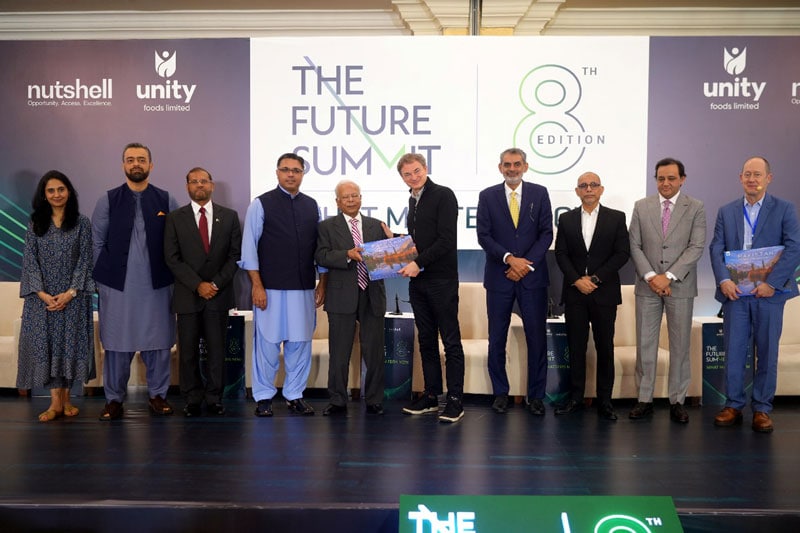The 8th edition of THE FUTURE SUMMIT 2024 concluded its second day with impactful discussions centered on critical topics shaping Pakistan’s future, including the future of healthcare, financial inclusion, the evolving financial sector, and the urgent need to rethink talent strategies.
This prestigious event brought together experts, policymakers, and business leaders to explore key challenges and opportunities for the nation. In his keynote address, Senator Dr. Musadik Malik, Federal Minister for Energy (Petroleum Division), emphasized the importance of education in driving progress. “The future of progress depends on education.
Without education, we have no future. We must know how many children enroll in school, how many drop out, and how many do not attend school at all,” he stated, underlining the pivotal role of education in shaping the nation’s future. During the opening session, global experts such as Konstantin Makarov, Senior Executive Officer at StratLink, Paul Keijzer, Co-Founder & CEO of The Talent Games, and Stéphanie Kioutsoukis, CEO of Fresh Solutions AI, discussed Pakistan’s potential to emerge as a leader in the global economy.
They highlighted the importance of strategic investment in human capital, climate resilience, digital transformation, and sustainable energy to unlock the country’s full potential. A major focus of the summit was healthcare, with Javed Ghulam Mohammad, Group Managing Director & CEO of Marn Dow Group, stressing the urgent need to improve pharmaceutical access in Pakistan. He pointed out, “Pharmaceutical access is compromised in Pakistan. Countries like the Philippines and Vietnam have a market size of 6-8 billion USD, whereas Pakistan, with a population of 250 million, has hardly a 3-billion-dollar market share in the pharma industry.”
In the financial inclusion session, leaders such as Christos Argyriou, CEO of MNT-Halan Pak B.V., and Rifah Qadri, Executive Director of easypaisa/Telenor Microfinance Bank, discussed how increasing access to financial services can empower individuals, boost entrepreneurship, and create opportunities for entire communities. The summit also delved into challenges within the banking sector, with Ali Khizar, Director Research at Business Recorder, alongside industry leaders like Muhammad Nassir Salim, President & CEO of HBL, and Rehmat Hasnie, President & CEO of National Bank of Pakistan, exploring ways to address sectoral obstacles. Experts also discussed the growing potential of the asset management industry, with projections indicating growth from 5% to 20% within the next decade.
Addressing diversity and inclusion in the workplace, Rabia Ahmad, CEO of Nutshell Group, led a discussion on the challenges posed by the rise of AI. She stressed the need to shift societal mindsets to foster more inclusive and diverse work environments. A fireside chat between Zafar Masud, Chairman of the Pakistan Banks’ Association, and Adnan Rizvi, Managing Partner at KPMG Pakistan, centered on the need for a collaborative dialogue regarding taxation and the banking sector’s role in supporting the nation’s financial ecosystem.
Dr. Ishrat Husain, former Federal Minister and Governor of the State Bank of Pakistan, highlighted the complexity of predicting the future, emphasizing that technology alone cannot address all concerns facing the country. The summit concluded with remarks from Simon Atkinson, Global Chief Knowledge Officer at Ipsos, Prof. Mark Turrell, Founder of unDavos, and Akif Saeed, Chairman of the Securities & Exchange Commission of Pakistan, who underscored the importance of strategic investment and collaboration in shaping a prosperous future for Pakistan. Air Chief Marshal Sohail Aman (Rtd), former Chief of Air Staff, concluded the event by urging collective efforts in building a sustainable future for the nation. “Together, we have examined the key issues shaping Pakistan’s future — from financial inclusion and healthcare innovation to sustainable energy, digital transformation, and redefining talent. Together, let us build a future that truly matters — for us, for Pakistan, and for the generations to come.”









